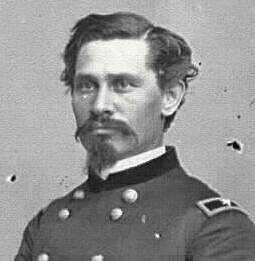 |
| Rosetta Wakeman 153rd New York |
There were other factors that drove Ames into the ranks. For instance, she was also motivated by patriotism as evidenced when she declared, "I wanted to do my part." This is accurate as quite a few women on both sides enlisted in order to fight for their respective causes. Additionally, some women joined the military to escape trying situations at home. It was an unwanted marriage that drove the fictional private into the ranks. This, too, is based on fact as Emma Edmonds was fleeing an older man to whom her father had promised her hand.
Obviously, Ames and Edmonds did not harbor feelings for these men, but what happened when they did fall in love with a fellow soldier? Such a development undoubtedly hurled them into an emotional crisis that required a delicate approach as there was a great deal of risk involved....on both sides. For the women, revealing one's heart would require revealing one's true identity, and that may very well result in a betrayal and dismissal from the army. And the men could be -and were - court martialed for assisting women into the ranks. So, as a man, do you betray your friend's secret? Or do you risk punishment?
This scenario went well for one historical character. When Loreta Velazquez revealed to Thomas DeCaulp her secret, he married her. Obviously, Private Ames' situation did not follow the same route because her beloved became angry that his pard had deceived him. And that's understandable. Trust is a fragile thing.
And then there was Emma and Jerome.
In August 1861, Edmonds was detailed as a nurse with the 2nd Michigan Infantry. A couple of months later, twenty-year-old Jerome Robbins began to frequent her hospital to visit a sick friend. They had much in common, from their love of reading, desire for intellectual pursuits, and strong Christian values that steered them away from camp vices. And then beginning on November 6th, the two started spending even more time with each other as Robbins' officers assigned him to permanent duty as a steward in Emma's hospital.
 |
| Jerome Robbins |
She told him.
And her love went unrequited. After offering him her heart, Jerome gave it right back but kept her secret. Edmonds was lucky. Some of her sister soldiers were betrayed by men who were privy to their true identity.
After recovering from the initial shock, Robbins continued to try to maintain a semblance of a friendship, but Emma was too brokenhearted. Robbins wrote in his diary, "Perhaps a knowledge on her part that there is one in a Michigan home that I do regard with especial affection creates her disagreeable manner." And then, "God knows my heart that towards her I entertain the kindest feelings, but it really seems that a great change has taken place in her disposition or that the real has been unmasked."
Christmas day 1861, Robbins noted that Edmonds had gone to serve as a nurse in the Mansion House hospital in Alexandria where she remained until March when Colonel Orlando Poe appointed her as regimental mail carrier.
 |
| Excerpt from Robbins' diary mentioning Emma serving in the Mansion House hospital |
While there seems to be a hint of regret over her fate, she appears to be content. Perhaps it's because Jerome had been replaced by James Reid of the 79th New York Highlanders. Whether there was any relationship between Emma and the married adjutant remains questionable. But it appears that Robbins didn't like the fact that he wasn't receiving as much attention from his friend, "Frank," as he once did.
So when Private Ames first appeared, did you know she was a woman? I honestly did. As fashion and social norms have changed over the last 150 years, the means in which we use to distinguish between men and women have also evolved. For example, we think nothing of women wearing pants. But it was illegal for them to wear men's clothes back then. Therefore, men did not even know what a woman looked like wearing trousers. I think General Orlando Poe offered the best illustration of the Victorian mindset regarding clothing and mannerisms when, in 1885, he wrote about Emma, "A single glance at her in her proper character caused me to wonder how I could have ever mistaken her for a man, and I readily recall many things that ought to have betrayed her except that no one thought of finding a woman in soldier's dress." (Edmondson File, RG 15, National Archives)
 |
| Sarah Emma Edmonds in feminine attire and Franklin Thompson |
 | |
| Orlando Poe Wikipedia |
Speaking of Ames' initial appearance on the scene, I nearly hurled over her hair. I really do have a pet peeve over locks. And I wouldn't be surprised to learn that the actress was wearing a wig, which is why it looked...well....goofy...under her ill-fitting forage cap. Come on, girl! Cut it off and pomade that mess down! And when I finally got past the hair thing, the voice made me cringe all over again. I'm surprised Dr. Foster didn't check her for a throat ailment or something. True, the voice is difficult to hide. The key is to not speak unless absolutely necessary and then speak softly. Turn down the tone and not the pitch. I don't think people realize....just....how....difficult it is to pull off this impression.
 |
| Pvt. Ames pbs.org |
 |
| Me |
Other Sources:
The Mysterious Private Thompson by Laura Leedy Gansler
Jerome Robbins collection at the Bentley Historical Library. The University of Michigan has digitized it, and you can access it by clicking (HERE).
Until next formation...rest...except for the suicidal Private Ames who is rushing off to the battlefield to get killed. *Edit: unfortunately, we will never know the fate of this woman soldier because Mercy Street was cancelled.

No comments:
Post a Comment